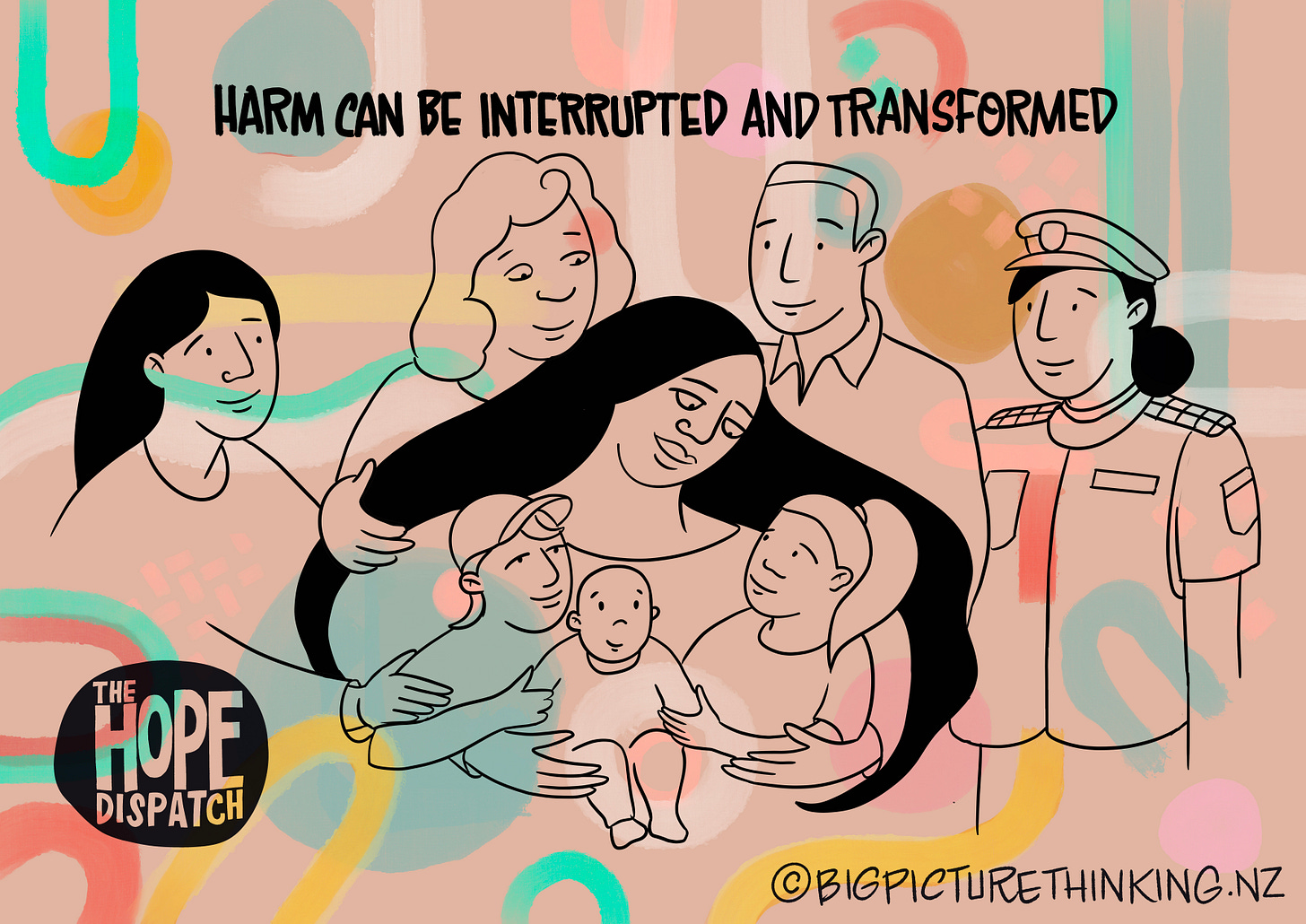- The Hope Dispatch
- Posts
- Finding hope in a family harm workshop
Finding hope in a family harm workshop
Harm, healing, and hope.
Hello, beautiful people,
On Thursday, I crossed a flooded city under a state of emergency—rivers breaching their banks, sirens echoing, people frantically piling sandbags to keep the rising waters at bay.
My destination? A gathering of the Family Harm Reduction Coalition, where I was live illustrating a conversation about violence, trauma, and healing.
One insight hit hard: our deep cultural habit of zooming in on who caused harm stops us from asking what caused the harm in the first place.
The problem is The System—that both creates and benefits from that harm.
What we’re really facing isn’t just a climate/biodiversity/housing/economic crisis—it’s a system crisis. One where the same logic that exploits people also exploits the planet. Where the harm done to forests and rivers mirrors the harm done to families and communities. We’ve grown so accustomed to systems that dominate, disconnect, and stack the odds, we’ve stopped recognising them as unjust.
We blame the individual, and we miss the system.
But here’s the hopeful part: systems can be redesigned. Culture is not fixed. Harm can be interrupted—and transformed.

Where to from here? Not all of us have the opportunity impact directly on The System. Here are some ideas about how to work on system-change for the regular Joe/Joanne/Johannes/Yosef.
Zoom out—name the system
Start by calling out an issue that is framed as individual failure rather than systemic design. Practice asking: “What’s the system here? Who benefits? Who pays the cost?” This simple reframing builds critical consciousness and it impresses your friends at woke parties.
Interrupt harm with your compassion
Whether it's in your home, workplace, schools, community —challenge blame-based narratives. We can support people who’ve caused harm and those who’ve been harmed. Call for restorative justice or transformative justice approaches.
Strengthen your social fabric
Isolation is a tool of domination. Connection is a form of resistance. Create or join spaces where you can talk honestly about harm, healing, and hope—like men’s circles, neighbourhood groups, climate action collectives, parent networks or a natter over the fence.
Support the people who are working on system change
Vote for, donate to, or amplify the voices of those advocating for structural change—whether it's in housing, climate, justice, or Indigenous sovereignty. Everyday actions include signing petitions, showing up at local meetings, and writing to MPs don’t seem to count for much, but the sentiment of many voices stands out to leaders.
Rewire resource flows
Money, time, and attention are all forms of power. Redirect yours toward mutual aid, cooperatives, climate-ready initiatives, or trauma-informed support services. (Even $5 a month makes a difference in a collective response.)
Show other people the patterns, connect the dots
Talk to kids about these ideas, share stories with your friends that show people aren't "bad"—they’re often shaped by forces they never chose. This helps break the shame cycle and grows a culture of shared responsibility.
Demand systemic solutions
Push back when you hear politicians and leaders call for personal responsibility and lifestyle changes, and insist on policies that address root causes—safe housing, liveable wages, violence prevention, and regenerative environmental policy. Politicians can be slippery - don’t let them shirk their responsibilities.
Make a splash!
Art and story are our people-powered powerful tools for unmasking systems and imagining alternatives. Your voice, your creativity, or your influence—no matter how small—all contributes to painting a picture of what’s possible - like this Hope Dispatch aims to do. It’s all about making little intersecting ripples of ideas, that eventually interlace the whole planet.
Let’s go all-in.
System change is collective work. Find your people (hello!), build trust, share the load, and rest when you need to. These systems of power and dominance have been operating for generations, so it will take generations to fix it. But it doesn’t have to be lonely or boring work : ) Joyful resistance is possible (this might just be my post for next week)
Here is a roadmap for where I sense we should head:

With great love and a belief that we are in the thick of a monumental transformation,
x Megan
P.S. I am trying to make these posts as condensed as I can. Brevity is the sister of talent and all that… so you can read the full story here.
P.P.S Just in case you need more evidence that Systemic Transformation is a happening thang…
P.P.P.S Win-win-win of the week, Prison Rehabilitation Through Beekeeping in Italy, grows confidence and skills, supports the environment, and generates revenue for more rehabilitation programmes. Just remember, prisoners are people carrying the personal load of systemic harm. They deserve to be healed and dignified. We all benefit from this approach.
Reply